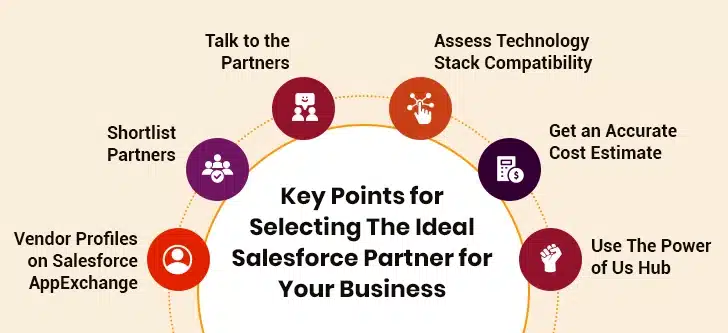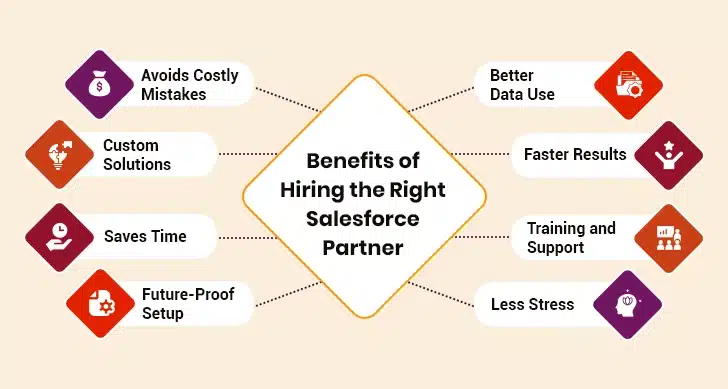One of the greatest strengths of the Salesforce Customer Relationship Management (CRM) system is its customization capabilities to meet the specific needs of businesses. The CRM software is an excellent tool in helping a company meet its goals provided that it has been configured correctly for the job. While buying and installing Salesforce is an important step for a business, the next few steps of customization, training, and implementation are what decide the success of the CRM.
Large companies might have their in-house tech teams that can help with the configuration and working of Salesforce solutions; however, smaller businesses might not have the same resources. If this is the situation, the smart choice would be to take on a Salesforce partner. Choosing a reliable Salesforce partner can be tricky because of the myriad of choices available. These six points can help you choose the best Salesforce certified partner for your business.
1. Vendor profiles on Salesforce AppExchange
AppExchange is an online marketplace where users can not only find Salesforce apps but also SFDC implementation partners. At the last check, there were 786 consultant partners registered on the app. These Salesforce partners have all been registered with Salesforce and have all been divided into tiers according to their performance and other criteria. The tiers include Global Strategic, Platinum, Gold, and Silver, and Registered Partners. Partners are also categorized under Popular Consultants based on customer ratings, and New Consultants who have just joined.
AppExchange is the best place when looking for a Salesforce ISV partner in the USA. The platform allows you to check ratings, customer reviews, specialties, and the number of certified experts among other things. By looking at the reviews, you can also find out if companies in a similar business to yours have used SFDC implementation partners and were happy with their services.
2. Shortlist partners
Once you’ve gone through AppExchange and looked at the various options you can shortlist a few top Salesforce partners that you would consider working with. Some shortlist criteria could include the partner’s location, previous track record, whether they have worked in your industry, and so on. The shortlisted SFDC implementation partners need not have worked with companies in your industry but could have handled projects like what you are working on. For example, if you are planning on launching a new product and you need a target-specific campaign, you can look for a Salesforce consultant who has worked with targeted product launches before regardless of the kind of product.
8 Factors to Evaluate Before Hiring a Salesforce Managed Service Partner
3. Talk to the partners
Interviewing Salesforce partners is just as important as interviewing a job candidate. Your company will need to work closely with the partner during the set-up and training stages and you need to be sure that the association will function well. When you talk to a Salesforce consulting partner firm representative, ask them specific questions about the projects your business handles. Also ask them about their work experience and how many consultants they have on their team.
If you are a large company, then you need to find a Salesforce partner with adequate resources to serve all your departments. A small consulting firm with just one or two experts might prolong the installation, customization and training processes. This will lead to longer downtime and possible business loss.
When talking to top Salesforce partners, make sure that they are competent in data migration, and can give you a close estimate of the time involved. You don’t want to risk any loss of data and you want to be prepared for the time that your systems will be offline. You can ask the partner about cloud storage backups to decrease the risk of data loss. When talking to Salesforce partners, make sure that they are competent in data migration, and can give you a close estimate of the time involved. You don’t want to risk any loss of data and you want to be prepared for the time that your systems will be offline. You can ask the partner about cloud storage backups to decrease the risk of data loss.
4. Assess Technology Stack Compatibility
Before choosing a Salesforce partner, always check if they can work well with the tools and systems you already use. Ask your potential partner the following questions:
- Do they know the specific Salesforce products you need (like Sales Cloud or Service Cloud)?
- Can they connect Salesforce with your other business software, like email tools or accounting systems?
- Are they comfortable with custom coding if your business needs special features?
- Do they follow the latest Salesforce updates so your system stays current?
A partner who understands your tech setup will help you save time, avoid integration problems, and ensure everything runs smoothly. Always discuss this before making a final decision.
5. Get an Accurate Cost Estimate
Interviewing the shortlisted Salesforce partners will help you narrow down your list even further. However, before you settle on one make sure to get a cost estimate from two or three potential partners. If you haven’t already budgeted for the adoption of Salesforce solutions, then the estimates can give you a clearer idea of what the rates are. If there is a range of rates you can choose the Salesforce ISV partner that matches your financial criteria.
Keep in mind that cheaper isn’t always better and if an offer is too good to be true you might want to dig around a bit more before zeroing in on one consultant. A Salesforce partner in the USA usually costs $150-$250 per hour just for the implementation.
6. Use The Power of Us Hub
The Power of Us Hub is a free online space where nonprofits using Salesforce can get help. It lets you connect with other charities using the same system. Here you can ask questions, share tips, and learn from groups facing similar challenges. The Hub has special tools made just for nonprofit needs. Before picking a partner, check if they’re active here. Good partners often help others in the Hub, showing they understand nonprofit work. You can also find recommended partners who specialize in helping organizations like yours. It’s like a helpful community center for Salesforce questions.
Types of Salesforce Partners
Salesforce partners come in different types, each helping businesses in their own way. Some help set things up, others build apps, and some teach how to use the system. Here’s how they differ, and see which one fits your business needs best.
| Partner Type | What They Do | Best For |
|---|---|---|
| Consulting Partner | Helps plan and set up Salesforce | Businesses needing help getting started |
| App Development Partner | Builds custom apps for Salesforce | Companies requiring special tools |
| Reseller Partner | Sells Salesforce licenses | Businesses wanting to buy Salesforce |
| ISV Partner | Creates ready-made apps for Salesforce | Companies wanting plug-and-play solutions |
| Training Partner | Teaches how to use Salesforce | Teams need to learn the system |
Why You Should Choose an ISV as Your Preferred Salesforce Partner
Benefits of Hiring the Right Salesforce Partner
The right Salesforce partner provides important benefits for your company. These advantages help you get the most from your investment. Good partners make implementation smooth and stress-free. Discover how they can help your team work better with Salesforce.
1. Avoids Costly Mistakes
When you work with a good Salesforce partner, they help you steer clear of expensive errors. These experts have set up Salesforce many times before, so they know what works and what doesn’t. They can spot potential roadblocks before they occur. Without their help, you might choose the wrong settings or buy unnecessary add-ons that waste money. A partner makes sure everything gets set up correctly the first time. This prevents situations where you’d have to pay extra to fix mistakes later. Their experience saves you from headaches and unexpected costs down the road.
2. Custom Solutions
The right Salesforce partner doesn’t give you a one-size-fits-all setup. They take time to understand exactly how your business operates. Then they adjust Salesforce to match your specific ways of working. This means your team can keep using processes that already work well for them. The partner adds tools and features that make those processes even better. You won’t have to change everything just to fit the software. The system gets built around what your business actually needs, not what someone thinks you should need.
3. Saves Time
A knowledgeable Salesforce partner gets things done much faster than trying to figure it out yourself. They know all the shortcuts and proven ways to set up the system. While they handle the technical work, your team can keep focusing on their regular jobs. There’s no long period where productivity drops while everyone learns the hard way. The partner can quickly train your staff on just what they need to know. This speedy setup means you start seeing benefits from Salesforce much sooner.
4. Future-Proof Setup
Good Salesforce partners plan ahead for your business growth. They don’t just set up what you need today. They create a system that can easily expand as your company gets bigger. This means you won’t outgrow your Salesforce setup in a year or two. When you need to add more users or new features later, it won’t require starting over. The foundation they build stays useful as your needs change. This forward-thinking approach saves you from expensive reworks down the line. Your Salesforce investment will keep working well for years to come.
5. Better Data Use
A good Salesforce partner helps you organize your business information properly. They set up the system, so all your customer details and sales numbers are easy to find. You can see everything in one place instead of searching through different files. The partner shows you how to create reports that help you make decisions. For example, you can quickly check which products sell best or which customers need follow-up. Clean, organized data helps your team work smarter and serve customers better. You won’t waste time guessing or looking for missing information.
6. Faster Results
Working with experts means Salesforce starts helping your business sooner. They know how to set up what you need first, so you see improvements quickly. Your team can begin using basic features within weeks, not months. Salespeople can track leads immediately. Customer service can access histories faster. The partner focuses on getting the most useful parts working first. This way, you don’t wait long to see how Salesforce makes work easier. Quick CRM setup means faster benefits for your company.
7. Training and Support
The partner teaches your team how to use Salesforce the right way. Training matches how your business actually works. They quickly answer questions and fix problems as they appear. Help continues post setup, so you’re never stuck. Employees learn just what they need for their jobs. New staff get proper training too. Good support prevents frustration and mistakes. You’ll have someone to call when things don’t work as expected. This makes everyone more comfortable using the system daily.
8. Less Stress
Experts handling the technical work remove tech worries. You don’t stress about setup problems or errors. The partner solves issues quickly when they happen. Your team can focus on their work, not software struggles. Knowing help is available gives peace of mind. The system runs smoothly with professionals managing it. Employees stay happy using tools that actually help them. Everything works smoothly when the complex parts are handled for you. This makes using Salesforce a positive experience for the whole company.
Choosing a Partner for Salesforce Implementation: Red Flags to Look Out for
Not all partners deliver what they promise. These red flags help you spot potential problems before signing any contracts. Better safe than sorry when making this important decision.
I. They Have No Experience in Your Industry
Salesforce works differently for different industries. If the partner has never worked with a business like yours, they might not know the best way to set it up. Ask for examples of past clients in your field. If they can’t show any, they may struggle to meet your needs.
II. They Promise Everything Will Be Perfect
No software or system is perfect. If a partner claims Salesforce will solve all your problems without any issues, they’re not being honest. Every business has unique challenges, and a good partner will explain possible difficulties and how they’ll handle them. Be careful of partners who make big promises without explaining the real pros and cons.
III. They Rush the Process
Setting up Salesforce takes time. If a partner pushes you to start quickly without proper discussions or skips important steps, it could lead to mistakes. A rushed job often means poor results. A good partner will take the time needed to do things right.
IV. They Don’t Offer Training or Support
After Salesforce is set up, you and your team will need help using it. If the partner doesn’t provide training or ongoing support, you might be confused when problems appear. Good partners will teach your staff how to use Salesforce and be available to help when needed, not just disappear after installation.
Summing Up
Your Salesforce ISV partner will play a major role in implementing the Salesforce CRM, customizing it to suit your business requirements, and training your staff to use it. Choose a reliable Salesforce-certified partner and make the most out of Salesforce solutions.
Hiring a Salesforce Consulting Partner Can Change the Way Users and Partners Manage their resources and investments. Check out this blog to know the benefits of hiring an accomplished Salesforce ISV Partner, read here: Salesforce Consulting Services: The Missing Piece in Puzzle for Users and Partners?








